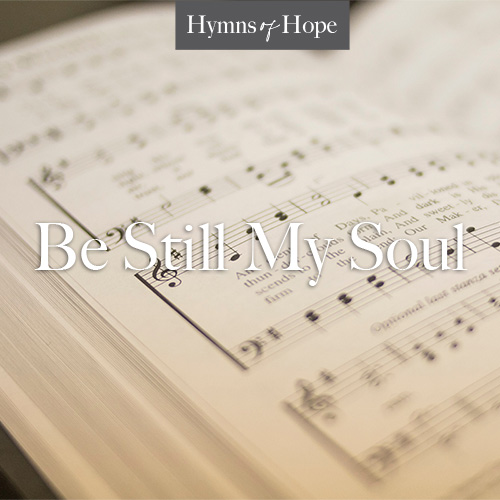Hymns of Hope: Be Still My Soul
Many of the hymns were born out of immense sorrow. In this series, we will examine these songs of old, discover the circumstances behind when they were written, and find comfort in the lyrics that so powerfully point us to the hope of Christ.

Many of us can think of specific hymns that have ministered to us in times of deep sadness and trial. “Be Still, My Soul” is one of those hymns for me. We chose to sing this hymn at my daughter’s funeral, and I sang it for months afterward when the silence of having no baby in the house became too much to bear. And now, I continue to sing this hymn as a reminder of God’s faithfulness and love in the midst of a chaotic and often scary world.
When I first heard “Be Still, My Soul,” I wondered what sorrow had touched the life of the writer, because I thought such a sad, yet hopeful, hymn had to be borne out of trial. Unfortunately, not much is known about the author, Katharina von Schlegel. According to most sources, she was born in Germany in 1697 and may have become a Lutheran nun. “Be Still, My Soul” is the only one of her hymns that was translated into English, and it was done so by Jane Borthwick in the 1800s. While we may not know a lot about the woman who wrote this beautiful hymn, we can find comfort in the beautiful lyrics that point us to Jesus Christ.
“Be Still, My Soul” is a reminder to the Christian to trust our loving heavenly Father—especially in the midst of grief and pain. The first stanza states:
Be still, my soul: the Lord is on your side;
Bear patiently the cross of grief or pain;
Leave to your God to order and provide;
In ev’ry change he faithful will remain.
Be still, my soul: your best, your heav’nly Friend
Through thorny ways leads to a joyful end.
The hymn is a command to the soul to trust God—to know that He has not changed and that He remains faithful even when it may feel like He is not near. While I love this entire hymn, the first stanza in particular has always brought me great comfort as it reminds me that God is on my side and will sustain me even when I think the pain is too much to bear. When my first two children died, I often struggled with trusting God and let my emotions supercede truth. I thought that my children dying meant that God was against me or angry with me instead of recognizing that all humankind dies as a result of our rebellion against God (Romans 6:23). The death of my children did not mean He was unfaithful or had turned against me.
It is very interesting to me that the last line of this stanza reminds us that God is our best Friend, and that it is through thorny ways (suffering) that we believers finally come to our deaths, which is where true joy begins when we will see Christ. Christ is our ultimate gift and, one day, we will see Him face to face and will truly think of our afflication as “light and momentary” ( 2 Corinthians 4: 17-18) even when it feels like anything but now.
Be still, my soul: your God will undertake
To guide the future as He has the past.
Your hope, your confidence let nothing shake;
All now mysterious shall be bright at last.
Be still, my soul: the waves and winds still know
His voice who ruled them while He dwelt below
The hymn continues with a beautiful reminder that God will continue faithfully guiding the future as He has the past. This notion was especially helpful for me as I mourned my children. I was told by older, godly counselors to remember God’s faithfulness. So, when I was tempted to be angry or think of God as unkind, I remembered specific ways I saw God working in my life in the past. I looked back to times where God had been faithful to me before, and doing so helped remind me that He would not fail me this time just as He had never failed me before. This truth instilled confidence in me that my God was near and that nothing in my life was out of His control.
Be still, my soul: when dearest friends depart,
And all is darkened in the vale of tears,
Then shall you better know His love, His heart,
Who comes to soothe your sorrow and your fears.
Be still, my soul; your Jesus can repay
From His own fullness all He takes away.
One of the things I find most beautiful about “Be Still, My Soul” is the fact that we do not know the circumstances in which it was written. It is evident that the author suffered during her lifetime, but we do not know exactly how. This is a good reminder to me that all people, and especially all Christians, will suffer in this life because we are called to be Christ-like, and our Savior was called the “Man of sorrows” (Isaiah 53:3).
Death is inevitable for all people, yet, for the Christian, deep anguish and despair should drive us closer to the Lord. Every human on this earth will taste death, but for the believer, our death ushers us into Christ’s presence. Sin and death bring suffering and pain, but our hope must be in Christ and not in this world or this life. This hymn reminds us that suffering helps us to better know Jesus’ heart and His love for us. It also reminds us that our suffering may look different from our neighbor’s, but we can still love each other and bear one another’s burdens (Galatians 6:2).
Be still, my soul: the hour is hast’ning on
When we shall be forever with the Lord,
When disappointment, grief, and fear are gone,
Sorrow forgot, love’s purest joys restored.
Be still, my soul: when change and tears are past,
All safe and blessed we shall meet at last.
“Be Still, My Soul” ends by reminding us that this life is not the end. We long for the day when we are face to face with Christ. While it is devastating to be away from our children—to never experience so many firsts with them—it is a beautiful reminder that they are already experiencing the joy of Christ’s presence. They are forever with the Lord. While I still miss my babies and long to hold them, I know they are already experiencing what we are all looking forward to after we die, and knowing they are in paradise brings me great comfort.
- Ravyn Canale
Hope mom to Noah and IsabelleRavyn is married to Anthony, and together they have three children: Noah, Isabelle, and Micah. Ravyn is a teacher and loves reading, writing, and hiking.
Are you a writer who would like to join the blog team? Learn more and apply here.



Got something to say?